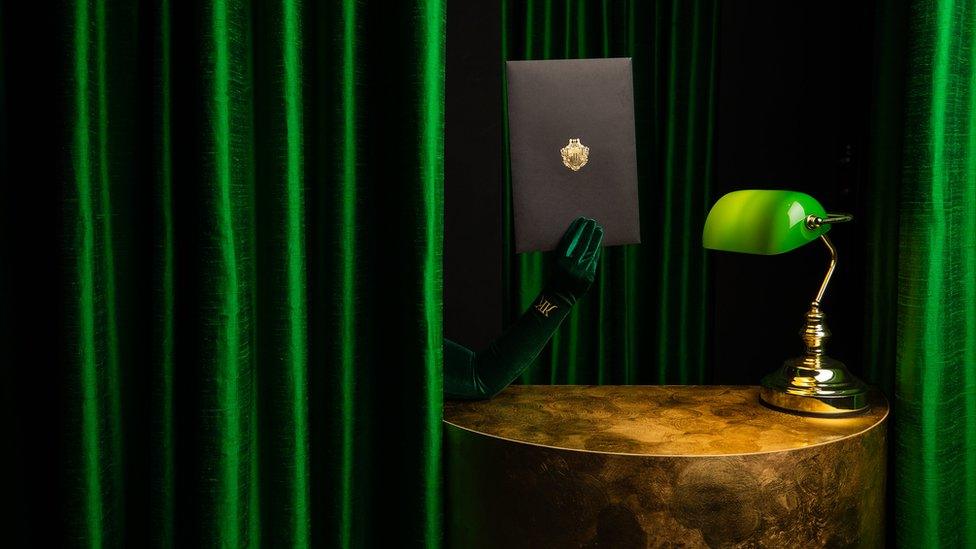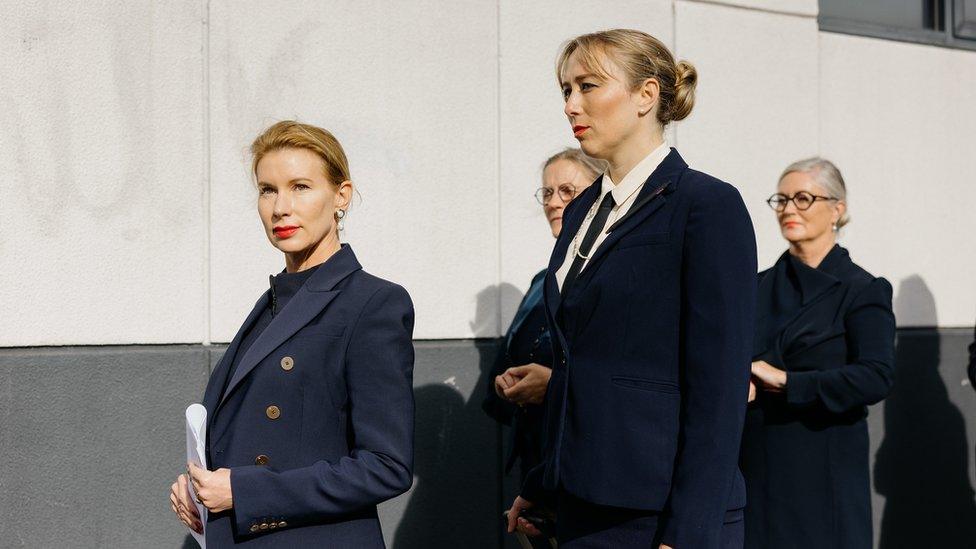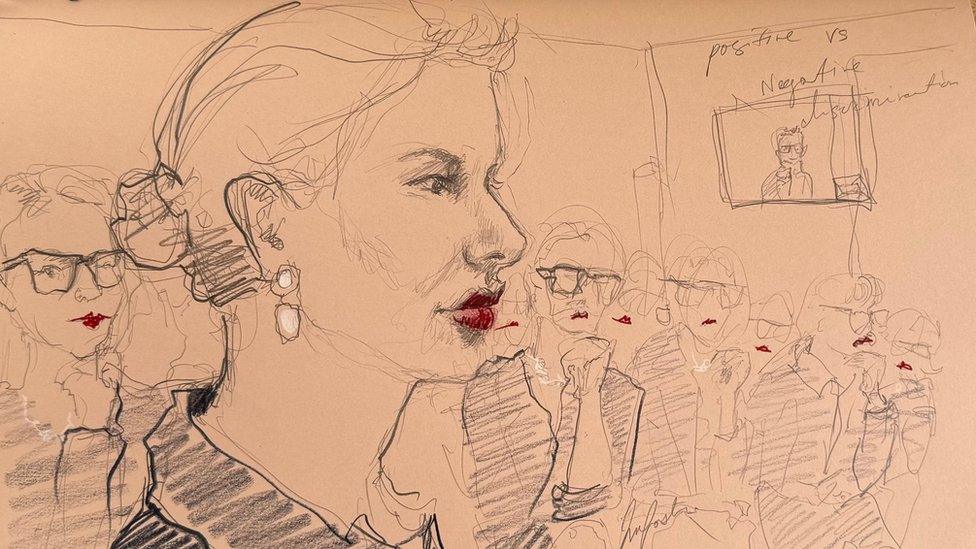Mona: Australian art museum sued over women's-only exhibit
- Published

The Ladies Lounge exhibit was introduced to Mona at the end of 2020
Inside Tasmania's famous Museum of Old and New Art lies a large, emerald-draped cube.
The walls are thick silk curtains. Within them, a cascading chandelier hangs over a phallus-shaped velvet couch and a chequered marble floor. Opulent gold accents everything - from the framed art on the walls to the furniture.
Women are ushered in and offered champagne by male butlers "who live to serve" them. But men are otherwise noticeably absent, turned away at the entrance.
This "Ladies Lounge" takes the concept of an old Australian pub and turns it on its head.
It was only in 1965 that women won the right to drink in the nation's bars. Previously, they were relegated to dingy side rooms, if admitted at all, and often charged exorbitant prices for their tipple.
And so, the exhibit - which contains some of the museum's most-acclaimed works, from Picasso to Sidney Nolan - was designed as a piece of interactive art, intended to provide a safe place for women to enjoy each other's company, while also highlighting the exclusion they faced for decades.
Artist Kirsha Kaechele calls it an "essential space for perspective and reset from this strange and disjointed world of male domination".
And it's one which could now be taken away by a man.
New South Wales resident Jason Lau has complained that the museum, known as Mona, is engaging in illegal discrimination.
This week, the accusation culminated in a high-stakes court hearing - rife with drama and theatrics.
Reparation or discrimination?
Tuesday started with a large group of women dressed in navy power suits, clad in pearls and wearing red lipstick marching into the hearing to support Ms Kaechele.
Mr Lau, by contrast, dialled in without a fuss via a video link. He had visited Mona - long known for its provocative art - while on a trip to Tasmania in April last year, he said, and bought the $35 (£18; $23) ticket expecting access to the whole museum.
"I was quite surprised when I was told that I would not be able to see one exhibition, the Ladies Lounge," he said.

Kirsha Kaechele (left) and her supporters arrive at court
Representing himself, Mr Lau argued it breaches the state's Anti-Discrimination Act.
"Anyone who buys a ticket would expect a fair provision of goods and services in line with the law."
The museum agrees the exhibit does indeed discriminate. But it argued that Mr Lau hasn't missed out on anything - he experienced the artwork exactly as intended.
"Part of the experience is being denied something that is desired," said Mona's counsel, Catherine Scott, according to local paper The Mercury.
Women have often been side-lined from places of power or prestige, and the exhibit was inspired to correct an imbalance which existed at Mona, says Ms Kaechele, whose husband owns the museum.
"It excludes men, and I would be lying if I were to say I didn't find it titillating," she told the hearing, according to The Mercury.
As the parties sparred, the museum's supporters were somewhat stealing the spotlight. They had periods of complete stillness and silence, before moving in some kind of subtle, synchronised dance - crossing their legs and resting their heads on their fists, clutching their hearts, or peering down their spectacles. One even sat there pointedly flipping through feminist texts and making notes.

Mona often makes headlines for its controversial exhibits
Apparently unperturbed, the parties continued arguing.
Ultimately, Ms Scott said Mona has a legal defence. The law - as written - allows for discrimination if "designed to promote equal opportunity for a group of people who are disadvantaged or have a special need because of a prescribed attribute".
According to Nine, when asked by tribunal deputy president Richard Grueber to explain how the artwork does that, Ms Kaechele said: "I have taken something that was used to keep women down and I have repurposed it into a triumphant space for [them]."
But Mr Lau argued that section of the law was designed to permit "positive discrimination" and not "negative discrimination".
He wants the lounge to either be closed or for it to admit men. Alternatively, he says men should have to pay less for a ticket than women - something the museum says it will not consider.
After Mr Grueber reserved his decision for a later date, which is yet to be determined, the museum's posse left as conspicuously as it came in - dancing out of the building in a conga line as one woman played 'Simply Irresistible' by Robert Palmer off her iPhone.
Art imitates life

A courtroom sketch of Kirsha Kaechele and her supporters
Speaking to the BBC the day after the hearing, Ms Kaechele says the case has felt like the art coming to life.
The exhibit was supposed to spark debate, yes, but has the spirit of a harmless practical joke, she argues.
"It brings up very serious and interesting conversations, but there's also something light hearted about it. Women delight in it and most men, I think, enjoy it. They find it funny."
Ms Kaechele says she is amused - but not surprised - by the men who are genuinely upset, though she hastens to add that Mr Lau has been pleasant and impressive.
"I think people might want to villainise him, but he's actually really lovely."
What does his case say about the themes the Ladies Lounge invokes, like male entitlement and the patriarchy, though?
"Well, I think it speaks for itself," she says.
Ms Kaechele has indicated she'll fight the case all the way to the Supreme Court if needed, but she says - ironically - that perhaps nothing could drive the point of the artwork home more than having to shut it down.
"If you were just looking at it from an aesthetic standpoint, being forced to close would be pretty powerful."
- Published27 December 2021

- Published27 January 2024
